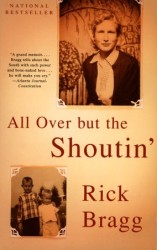Is there any feeling quite as pleasant as being a few pages into a book and realizing you’ve got a great one in your hands? The tactile message from your right hand reminding you there are lots of pages ahead is as delightful as sitting down to a banquet after glimpsing the bounty lined up in the kitchen.
For years I’ve heard about Rick Bragg and his books, All Over but the Shoutin’ and Ava’s Man, from my colleagues in memoir reading and writing. I had a void in my library request list recently–meaning the New York Times hadn’t reviewed any memoirs that appealed to me–and I decided it was time to catch up on overlooked classics. I’ve just finished All Over but the Shoutin‘.
Frankly, I’m not good at the “lit-crit” style of writing. If I love a book I love it dumbly, blindly, like a besotted schoolgirl, not like a Comparative-Literature-majoring college coed. I can’t give you a deeply reasoned expression of why I think this book deserves a place on every memoir writer’s shelf. I can only say… I’ve fallen for Rick in a big way. Oh, there are a few stylistic touches worth mentioning, and maybe emulating in your own writing–his way of beginning a chapter musing in the second-person voice, then shifting to his own first-person voice as the story gets under way, or the way he allows a certain amount of southern dialect to live on the page, in spite of being a Pullitzer-prize-winning reporter who surely has learned better by now. (Which explains the “Shoutin-apostrophe” in the title.)
This book goes on the shelf in the section on southern life, with its evocations of scenes like Dinner on the Ground at the Hollis Crossroads Baptists Church circa 1962, its memories of a little boy in hand-me-down shoes riding the cotton sack behind his momma as she picked because there was no one home to leave the baby with.
This could easily fit on the shelf with the “awful childhood memoirs” next to The Glass Castle or The Liar’s Club. But its most compelling storyline–Rick’s desire to give his mother a reward on Earth that she only expects to find in Heaven–fills it with a haunting pairing of emotional generosity and self-reproach.
The book jacket will tell you “It is the story of a war-haunted, hard-drinking father and a strong-willed, loving mother who struggled to protect her sons from the effects of poverty and ignorance that had constricted her own life.” The reviews relate that Bragg tells his story with “emotional generosity and effortlessly compelling storytelling.”
Take the chapter titled “Saturdays in October.” Bragg describes being a 19 year old hired to write sports journalism for the Talladega Daily Home, covering the races at Talladega International Motor Speedway, where “most of the drivers had learned [the sport] running likker in the mountains of the Carolinas, or had learned it from people who did.”
On page 139 of the hardback edition, he writes: “But Lord, it was thrilling. The sound alone would rock you like a billion angry hornets in a giant bucket, and every time the cars flashed around the track, death was just a twitch away. I was slowly beginning to realize that the only thing that was worth writing about was living and dying and the trembling membrane in between.”
That sentence gets at why I find memoir as a genre so compelling, and why I found Bragg’s writing so enjoyable. He ties a generous sense of humor to a gentle self-deprecating way of riding the story as its protagonist but never its hero.
I just put a library hold on Ava’s Man, his 2002 book about his mother’s family. If there’s anything as pleasant as being a few pages into a book and realizing you’ve got a great one, it’s knowing that another book by the same author is on its way.


Nice sentence, Sarah. “He ties a generous sense of humor to a gentle self-deprecating way of riding the story as its protagonist but never its hero.”
His language and accent draw me and hold me in the same way Tommy Lee Jones draws me to any movie he’s in. Heck of a storyteller, too!
LikeLike
can someone tell me all the people in the book???
LikeLike